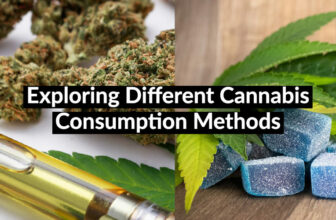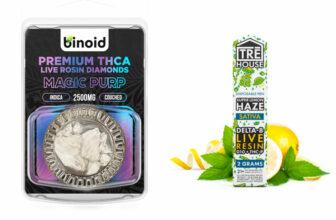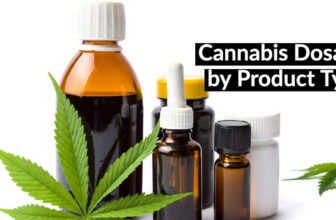Whether a beginner or a connoisseur at using cannabis, you’ve probably heard about tetrahydrocannabinol (THC) and Delta 9. Alongside over 100 cannabinoids, these compounds are derived from marijuana and hemp plants, and they are known for their psychoactive properties.
Legalizing cannabis for medical or recreational purposes has opened the floodgates for the cannabis sector, which has grown into a multi-billion-dollar industry.
As a result, dispensaries carry several products ranging from concentrates such as shatters, rosin, wax, and dabs to edibles, like tasty and potent Delta 9 Gummies — each with varying THC content.
But isn’t Delta 9 and THC the same? Let’s find out.
What is Traditional THC?
Alongside cannabidiol (CBD), THC is one of the many identified cannabinoids in marijuana and hemp. It has psychoactive properties and is responsible for making people ‘high’ or intoxicated. THC activates the release of ‘feel good’ hormones called dopamine.
To the uninitiated, the difference between marijuana and hemp is that the latter contains low levels of THC, typically 0.3% or less. Hemp-derived products don’t contain enough THC to generate a feeling of euphoria.
Raw cannabis contains THC acid (THCA) that needs to be processed, typically by heating, to be activated and turned into psychoactive THC.
What is Delta 9?
Cannabis plants contain different forms of THC, the most abundant of which is Delta 9. This is the reason people often use the two interchangeably.
Besides causing a feeling of intoxication, this specific cannabinoid is responsible for most of the effects linked to cannabis consumption and use, such as increased appetite and creativity. As such, it’s the most popular THC form known to the medical community. And while small studies have found promising benefits for certain medical conditions, more research is needed to establish its effectiveness.
Delta 8 versus Delta 9
As an enthusiast, you may have also heard about products containing Delta 8. For comparison, these compounds are two types of THC, and they almost have the same chemical composition. The only difference is that they have differently positioned carbon and carbon double bonds. Besides being structurally different, Delta 8 is less potent and doesn’t give a user the same level of ‘high’ as Delta 9.
Are there Differences Between Traditional THC and Delta 9?
Now that we’ve covered the basics of these two compounds, it’s time to drill into the specifics.
Earlier, we mentioned that Delta 9 is a highly present and most popular form of THC. And that’s why THC, in its classic form, is also called Delta 9.
You’ll further understand why in the section below.
Chemical Composition
We don’t want to get geeky and teach you a chemistry lesson. However, knowing the chemical formula is essential to understanding these compounds.
A regular THC’s chemical composition is expressed as C21H30O2. In layperson’s terms, this means it comprises 21 carbon, 30 hydrogen, and 2 oxygen atoms. Unsurprisingly, Delta 9’s chemical formula is the same.
Manufacturers of cannabis derivative products rely heavily on understanding chemical compositions and introducing methods to process them effectively and safely.
Converting THCA To Delta 9 THC
Natural processes within the cannabis plants lead to the production of cannabigerolic acid (CBGA). This organic chemical is touted as the main source of cannabinoids—including THC and its non-psychoactive counterparts, such as cannabidiol (CBD) and cannabichromene (CBC).
An enzyme acts on CBGA, converting it to THC acid (THCA), the precursor to THC. THC is an organic compound and, therefore, shouldn’t be mistaken for its synthetic cousin, THC-O acetate. We’ll discuss more about this novel product in the succeeding sections.
Warm temperatures or degradation initiate the Delta 9 THC production process, known as decarboxylation. When a cannabis plant is exposed to heat, THCA breaks down and converts to Delta 9 THC.
THC is produced once the THC acid loses the carboxyl group, which consists of two oxygen atoms and one carbon and hydrogen atom.
The conversion duration will depend on several factors, including specific temperatures, length of exposure, packaging, handling, and storage.
For example, when left to occur naturally at room temperature or in sunlight, it can be much slower, taking days or even longer. Through vaporizing, it may only take a few minutes.
THC-O Acetate Vs. Regular THC
THC-O acetate is a synthetic derivative created through the acetylation of THC, particularly through the chemical called acetic anhydride. THC-O’s production involves several processes, including distillation, solvent recovery, and liquid-liquid extractions.
THC-O is making waves on the market for purportedly being twice to three times more potent than THC. For this reason, however, authorities and experts have expressed their worries about its potential serious side effects.
Consumption of Delta 9 THC
To maximize the effects of Delta 9 THC, it has to be absorbed through the lungs. The fastest way to do this is through vaping, smoking, and dabbing. Consuming high-quality products and using the right vaping and dabbing accessories are also crucial to optimizing its effects.
Effects Of Delta 9 THC Consumption
Concentration levels, dosage, and product quality play key roles in the effects of THC consumption. Moreover, individuals process psychoactive substances differently.
Generally, THC works by interacting with the body’s cannabinoid receptors in the brain. This substance may introduce changes in a person’s emotions, pain perception, movement, and memory.
Aside from its psychoactive effects, studies and anecdotal reports show that medical marijuana use may alleviate pain, reduce inflammation, ease certain neurological symptoms of sleep disorders, and help minimize the impact of cancer treatments, including loss of appetite, nausea, and vomiting.
Potential Adverse Effects
Considering that THC is a psychoactive compound, users can expect some level of euphoria. At the same time, some may feel the side effects more. These could include anxiety, thinking and speaking difficulties, rapid heart rate, and eye redness.
Is Traditional Delta 9 THC Legal?
States have different local laws governing the use, sale, and possession of cannabis-derived products.
In some jurisdictions, the consumption of cannabis derivatives is allowed for medical or recreational use. At the same time, a few states completely ban cannabis intake.
Domestic laws on cannabis are constantly evolving, and it’s crucial that you’re aware of the current regulations that apply in your state.
Under federal law, however, cannabis products containing more than 0.3% THC are illegal.
Final Thoughts
Delta 9 is the most common form of THC present in cannabis plants. Unlike other cannabinoids like CBD, it has mind-altering properties. It has been the subject of regulations in most states and countries.
Before consuming THC products in any form, it is crucial to consult with a medical professional and learn about the current laws applicable to your state.
Purchasing from trusted dispensaries and manufacturers with lab-tested products is just as important. In doing so, you’re assured of having an enjoyable and safe experience and avoiding the risks of improper dosage and use.




